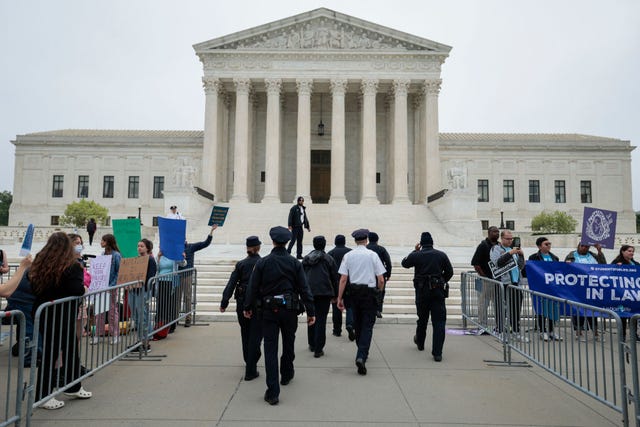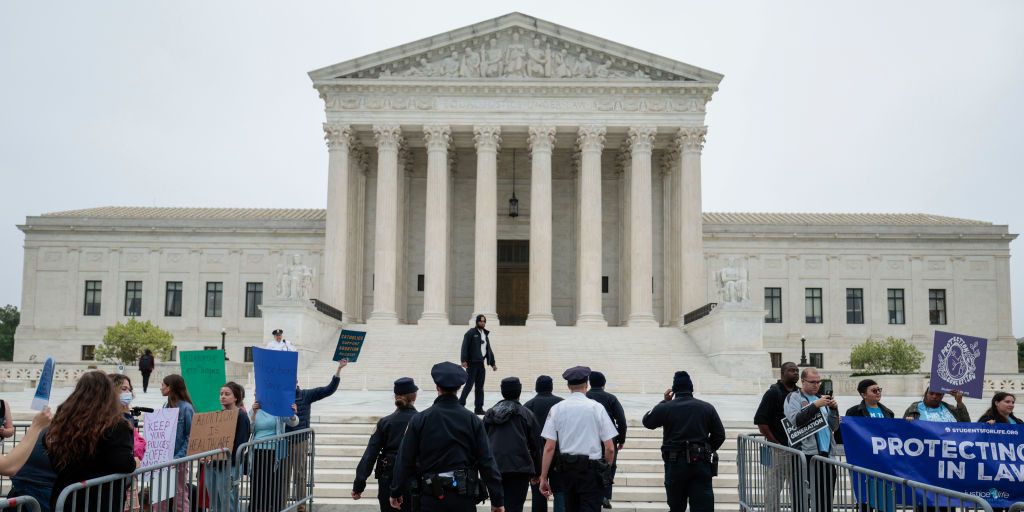
Anna MoneymakerGetty Images
In the midst of the Met Gala last night, Politico broke the shocking news that, according to a leaked draft opinion, the Supreme Court has voted to overturn Roe v. Wade, the landmark decision that guarantees the right to abortion under the U.S. Constitution. (But it’s important to note that, for now, abortion remains legal in every state.)
As Justice Samuel Alito write in the draft, “Roe was egregiously wrong from the start…It is time to heed the Constitution and return the issue of abortion to the people’s elected representatives.” Alito also wrote that the 1992 decision Planned Parenthood v. Casey, which affirmed the basic ruling in Roe, should also be struck down.
Although the ruling has not yet been officially handed down—and leaking a draft opinion is without precedent in the modern history of the highest court—Roe has been under attack almost since the decision was issued in 1973. While media reports have noted that decisions, and even justices’ votes, can change before their release, many see the news as something of a foregone conclusion given the Court’s conservative majority.
But let’s answer your most burning question: What happens if Roe v. Wade is overturned?
If Roe is struck down, a Guttmacher analysis found that 26 states would likely substantially restrict abortion access. (Those states are Alabama, Arizona, Arkansas, Florida, Georgia, Idaho, Indiana, Iowa, Kentucky, Louisiana, Michigan, Mississippi, Missouri, Montana, Nebraska, North Dakota, Ohio, Oklahoma, South Carolina, South Dakota, Tennessee, Texas, Utah, West Virginia, Wisconsin, and Wyoming.) Thirteen states have so-called “trigger laws” in place that would almost immediately ban abortion if Roe is overturned. Nine states have pre-Roe bans that could be legally enforced if the ruling is struck down, and four states—Alabama, Louisiana, Tennessee, and West Virginia—have passed their own constitutional amendments that prohibit any legal protections for abortion.
Just 16 states and the District of Columbia have passed laws protecting the right to abortion.
You can read a state-by-state breakdown of what the overturning of Roe v. Wade could mean for your state here.
As far as how this ruling could implicate women across the country, striking down federal abortion protections would have an immediate chilling effect on access to abortion services. For a glimpse of a post-Roe America, the New York Times looked to Texas, which signed a bill into law in September that outlaws most abortions. As of this year, people seeking care must undergo state-directed counseling that discourages abortion ahead of a waiting period, which means two trips to the provider (and two rounds of traveling, taking time off work, and securing child care).
Also among the long list of restrictions Texas residents now face under the law, per Guttmacher: the patient must undergo an ultrasound and have the image explained to them, private insurance only covers abortion “in cases of life endangerment or if the woman’s health is severely compromised,” and abortions can only be performed after six weeks—before most people even know they’re pregnant—“only in cases of life endangerment or severely compromised health.” There’s also been a major uptick in Texans driving long distances, some as long as nine hours, per The 19th, to seek abortion care in neighboring Louisiana.
According to the New York Times, the average person seeking an abortion is already a mother, in their late 20s with some college education, and has a low income.
This content is created and maintained by a third party, and imported onto this page to help users provide their email addresses. You may be able to find more information about this and similar content at piano.io
